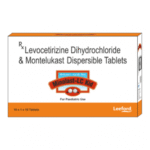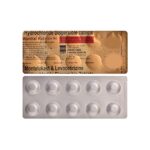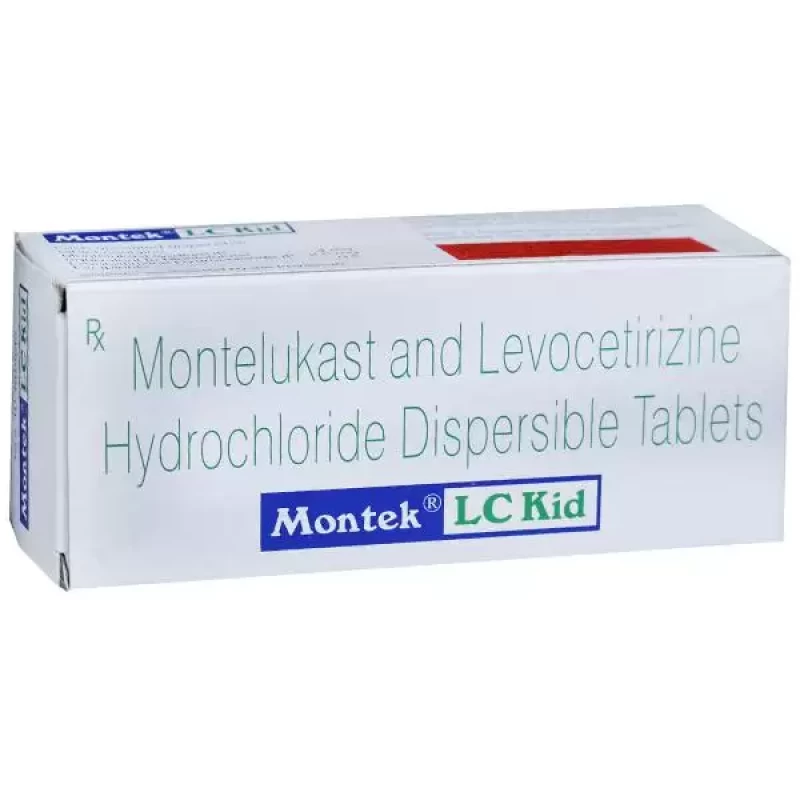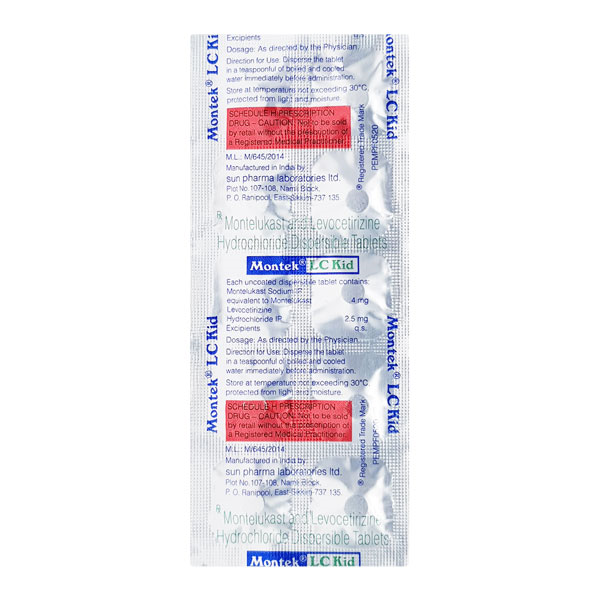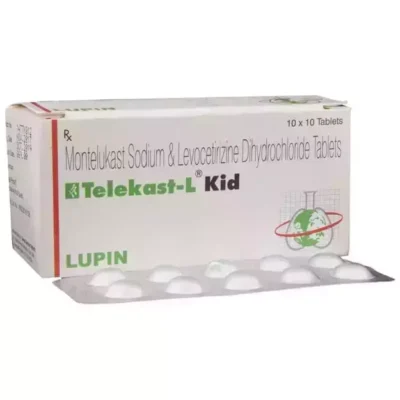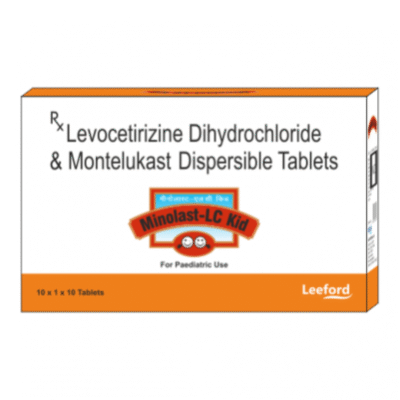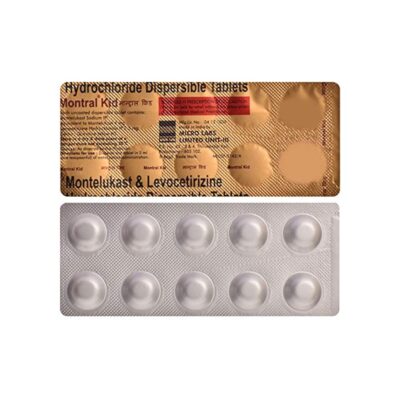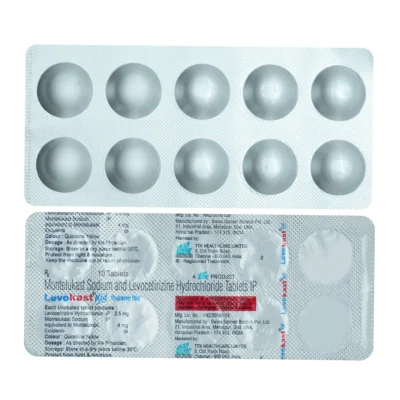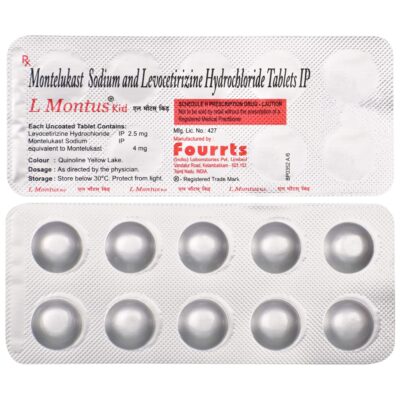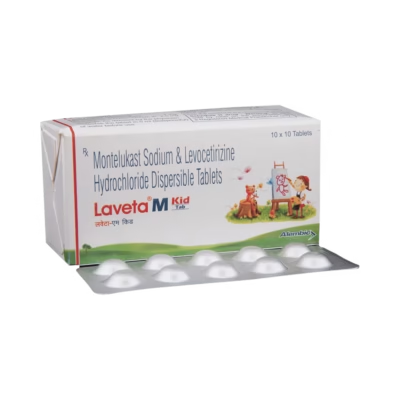Description
🌿 Montelukast 4 mg + Levocetirizine 2.5 mg Tablet
Combination Therapy for Allergic Rhinitis & Asthma Support
🔍 Overview
Montelukast 4 mg + Levocetirizine 2.5 mg is a fixed-dose combination medication commonly prescribed for allergic rhinitis, seasonal allergies, and mild asthma symptoms. This dual-action tablet helps control allergy symptoms and inflammation by combining an antihistamine (Levocetirizine) with a leukotriene receptor antagonist (Montelukast).
💊 Ingredients & Mechanism of Action
-
Montelukast (4 mg):
A leukotriene receptor antagonist that blocks substances (leukotrienes) responsible for inflammation, bronchoconstriction, and mucus production in asthma and allergic rhinitis. -
Levocetirizine (2.5 mg):
A third-generation antihistamine (R-enantiomer of cetirizine) that blocks histamine H1 receptors, reducing symptoms like sneezing, runny nose, watery eyes, and itching.
📌 How to Use
-
Dosage: Usually taken once daily, preferably in the evening.
-
Route: Oral, with or without food.
-
Pediatric Use: Often prescribed in this lower dose (4 mg/2.5 mg) for children aged 2–6 years, depending on weight and condition severity.
-
Missed Dose: Take as soon as remembered unless it’s almost time for the next dose. Do not double dose.
✅ Common Indications
-
Seasonal allergic rhinitis (hay fever)
-
Perennial allergic rhinitis
-
Mild to moderate asthma
-
Chronic urticaria (off-label)
⚠️ Common Side Effects
-
Headache
-
Drowsiness or fatigue
-
Dry mouth
-
Abdominal pain
-
Diarrhea or nausea
-
Cough
🚨 Serious Side Effects (Rare but Critical)
-
Behavioral changes (e.g., aggression, anxiety, depression, suicidal thoughts – mostly linked to Montelukast)
-
Severe allergic reactions: rash, itching/swelling (especially of face/tongue/throat), severe dizziness, trouble breathing
-
Seizures
-
Palpitations or chest pain
Seek immediate medical attention if any of the above occur.
🩺 Monitoring & Follow-Up
-
Initial Assessment: Evaluate allergy/asthma symptoms and possible drug interactions.
-
Ongoing Monitoring:
-
Behavioral or mood changes (especially in pediatric patients)
-
Symptom control effectiveness
-
Liver function in rare long-term use
-
-
Patient Follow-Up: Every 4–6 weeks initially, then periodically based on response.
⚠️ Warnings & Precautions
-
Neuropsychiatric Events: Montelukast may rarely cause mood swings, aggression, depression, or suicidal ideation. Monitor closely.
-
Sedation Risk: Levocetirizine may cause drowsiness; avoid alcohol and sedatives.
-
Renal Impairment: Dose adjustment may be required for Levocetirizine.
-
Liver Disease: Use Montelukast cautiously in hepatic impairment.
-
Allergy to Components: Contraindicated in known hypersensitivity to either ingredient.
📝 Summary
Montelukast 4 mg + Levocetirizine 2.5 mg tablets offer dual benefits for patients with allergic rhinitis and mild asthma. While generally safe and well-tolerated, the combination requires attention to behavioral side effects and potential sedation. Regular follow-ups and awareness of symptoms are essential for safe use, particularly in children.
Always follow your doctor’s advice, dosage instructions, and never self-medicate.
Note: This information is intended for educational purposes and should not replace professional medical advice. Always consult your healthcare provider for personalized recommendations.
